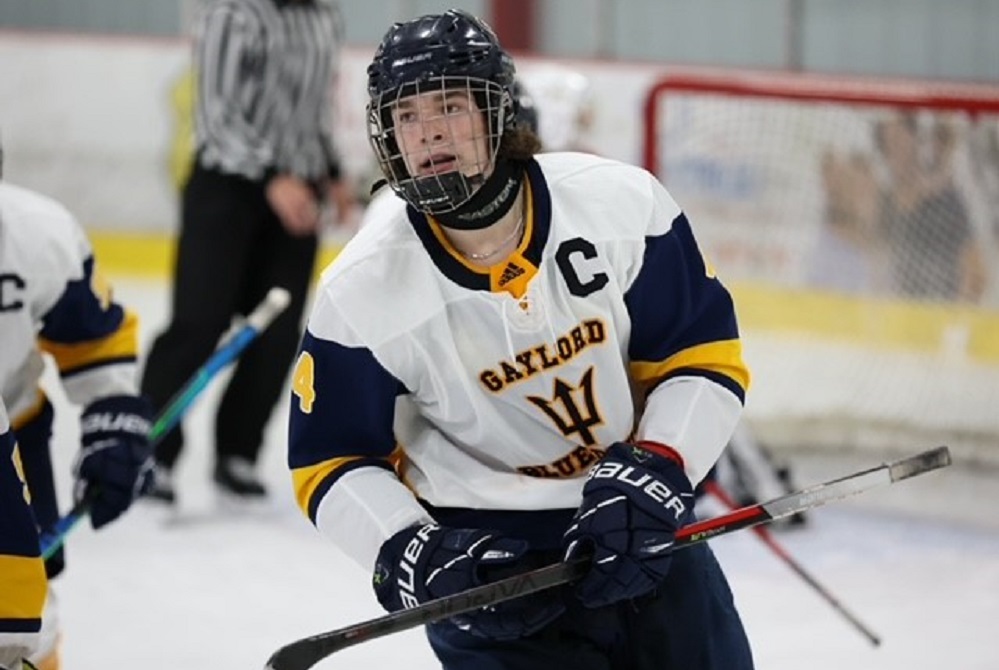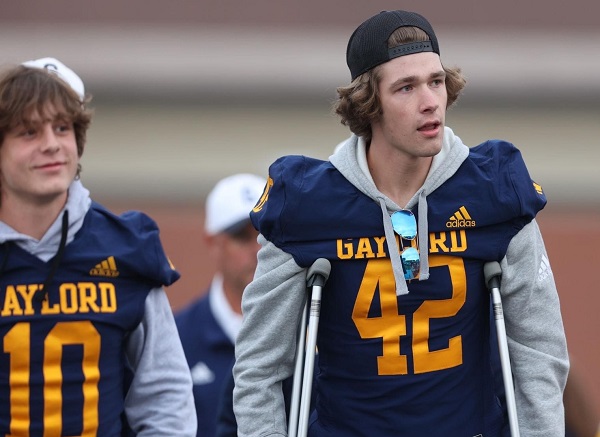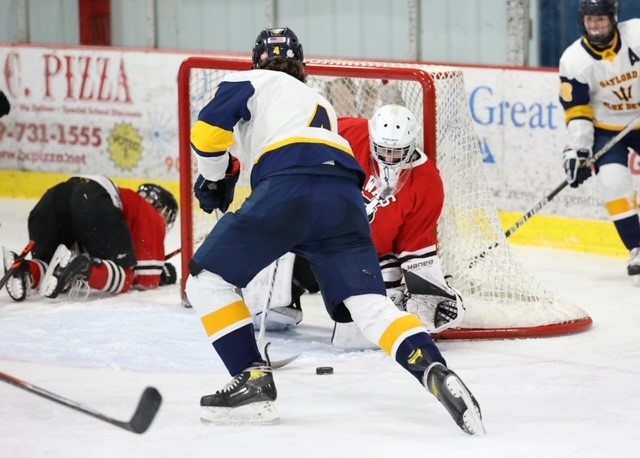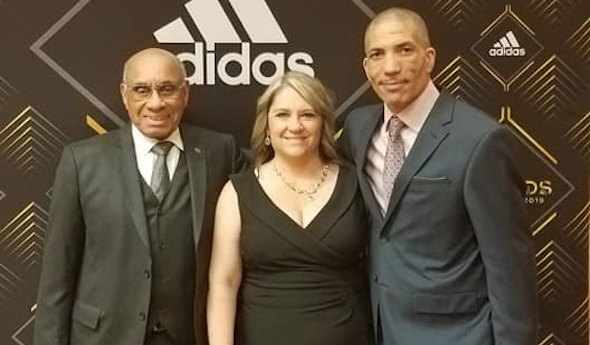
Gaylord's Looker Shows 'Different Type of Tough' in Return from Knee Tear
By
Tom Spencer
Special for MHSAA.com
February 3, 2023
When Gage Looker went down with an ACL injury in Gaylord’s first football game this fall, Liz Harding – president of the Blue Devils’ hockey boosters – was absolutely devastated.
 Looker, an all-conference hockey defenseman last winter, was playing, as a senior, in his first-ever varsity football game. Harding, also Looker’s mom, was there.
Looker, an all-conference hockey defenseman last winter, was playing, as a senior, in his first-ever varsity football game. Harding, also Looker’s mom, was there.
“I caught the one and only picture of him playing football just before he injured himself,” Harding recalled. “I was devastated!”
Doctors indicated surgery was necessary and recovery would prevent Looker from getting back on the ice, the football field and the track where Looker had dreams of great success this year.
“Knowing hockey is his passion — and thoughts of him not playing did not set well with me — Gage started what I would call standard physical therapy a couple days after surgery and then added an additional blood flow therapy with our local trainer to his weekly routine,” Harding said. “Through his hard work and determination, he is back on the ice.”
The Blue Devils, after graduating their other four all-conference players from last winter, were 2-11 this year when Looker returned to the ice against Big North Conference rival Petoskey. Gaylord has won three of seven since.
Gaylord coach Jamie Voss believes Looker’s return was pretty much a miracle. And he thinks Looker is playing at about 80 percent despite being only a few months removed from the injury.
“Gage tore his ACL and was told by doctors his sports life was over,” Voss said. “Gage would not accept this, and he trained harder than any kid I have ever witnessed to prove the doctors wrong.”
Sans injury, Voss notes Looker was certain to graduate on several all-time Gaylord hockey record lists.
“The reports on his progress and rehab were literally off the charts for this type of injury,” Voss said. “His doctors reported early that they have never seen this occur before regarding the strength developments in the afflicted areas that support his ACL tear.”
Voss admitted he had to hold his breath a little – as many Gaylord supporters did – when Looker joined the starting lineup against Petoskey. That moment came after just a week on the ice, including full contact practices.
 “More important than records to Gage was his commitment and obligation to be our team leader as our compete level was predictably down this season,” Voss said. “Gage is one of the best athletes and citizens that I have ever been allowed to coach.
“More important than records to Gage was his commitment and obligation to be our team leader as our compete level was predictably down this season,” Voss said. “Gage is one of the best athletes and citizens that I have ever been allowed to coach.
“He is not only a leader to the players on and off the ice, but Gage also is the kind of kid that coaches learn from,” Voss went on. “He is mature beyond his years.”
Looker, who started playing hockey at 4 years old, dabbled with football as a freshman although an eighth-grade hip injury kept him away from the field until this fall. Looker’s size – 6-foot-3, 245 pounds – led to many encouragements to give football another try.
“I went the rest of my high school career being told that I needed to play football,” Looker said. “So I said ‘why not’ my senior year because I could use the extra strength for hockey.”
Looker knew the morning after his one-and-only career football game that he needed medical attention promptly. A quick MRI showed extensive damage.
Looker was told he literally “blew apart” his ACL.
“My stomach dropped,” Looker said. “I was not ready for that at all.
“I was shown what my PCL looked like and then went to where my ACL should be, and it was gone — some say it was deleted,” Looker continued. “I was told I will not be able to play sports for about seven to nine months, and I was speechless.”
Two months after surgery and extensive physical therapy, Looker tried to skate. It went so well he began to entertain thoughts of playing hockey again. He may aspire to compete in track & field this spring.
“He runs a 56-second quarter mile and throws the shot put 48 feet, 10 inches,” Voss said of his dominating defender. “And although he is restricted from running, something tells me this kid will run track this spring.”
While it is not the senior hockey season it could have been without the injury, many are glad to just have Looker on the ice. His mom is among them.
 “I am overjoyed to have him back on the ice,” Harding said. “At least he is getting in a few games and is out there making a difference.
“I am overjoyed to have him back on the ice,” Harding said. “At least he is getting in a few games and is out there making a difference.
“The smile on his face is priceless,” she continued. “Perhaps he'll continue with track as he is set to break records there too.”
Rehab fresh out of surgery was “very boring,” so Looker started intensifying his recovery with therapy four days a week for a few months.
“It was a lot of commitment, but I needed my senior year of hockey,” Looker said. “I was doing the basic things, and then I had a machine that could stimulate my muscles and pump blood to my knee.
“It is called ARPneuro,” he continued. “I was skating with that on my leg as well as doing mini workouts at home.”
ARP — accelerated, recovery and performance — reportedly accelerates recovery time by decreasing chronic pain and increasing range of motion without the use of medications.
“I was always putting as much work in as I could,” Looker said. “It definitely paid off in the end.”
Looker’s coach agrees.
“I have never heard of this, nor witnessed it,” Voss said. “Gage Looker is an anomaly, and in my opinion a different type of tough.
“Gage returned to practice full contact three months after he tore his ACL,” Voss continued. “And he played his first hockey game logging 30 of 51 minutes a week later.”
Looker credits the support and effort of his medical team and his teammates for helping him get back on track. However, no one gets more credit that the booster president.
“My mom and teammates helped me through it,” he said. “My mom was always on me about doing my workouts and keeping me disciplined.”
 Tom Spencer is a longtime MHSAA-registered basketball and soccer official, and former softball and baseball official, and he also has coached in the northern Lower Peninsula area. He previously has written for the Saginaw News, Bay County Sports Page and Midland Daily News. He can be reached at [email protected] with story ideas for Manistee, Wexford, Missaukee, Roscommon, Ogemaw, Iosco, Alcona, Oscoda, Crawford, Kalkaska, Grand Traverse, Benzie, Leelanau, Antrim, Otsego, Montmorency, Alpena, Presque Isle, Cheboygan, Charlevoix and Emmet counties.
Tom Spencer is a longtime MHSAA-registered basketball and soccer official, and former softball and baseball official, and he also has coached in the northern Lower Peninsula area. He previously has written for the Saginaw News, Bay County Sports Page and Midland Daily News. He can be reached at [email protected] with story ideas for Manistee, Wexford, Missaukee, Roscommon, Ogemaw, Iosco, Alcona, Oscoda, Crawford, Kalkaska, Grand Traverse, Benzie, Leelanau, Antrim, Otsego, Montmorency, Alpena, Presque Isle, Cheboygan, Charlevoix and Emmet counties.
PHOTOS (Top) Gaylord’s Gage Looker has returned to the ice this season only a few months after a serious knee injury. (Middle) Looker, right, watches his football teammates from the sideline this fall. (Below) Looker tries to stuff the puck past Tawas’ goaltender. (Photos by Rob DeForge/RD Sports Photo.)

Flint's Phillips Named NHL 'Community Hero'
By
Paul Costanzo
Special for MHSAA.com
June 20, 2019
Rico Phillips had convinced himself before Wednesday night’s NHL Awards that he wasn’t going to win the Willie O’Ree Community Hero Award.
It was the easiest way to kill nerves that went along with having to speak in front of a room filled with NHL superstars and legends, as well as a national television audience.
But as the award was about to be announced, and a video montage started playing on the screen, the realization he could win started to come back to Phillips. Then O’Ree said his name.
“When I watched Willie O’Ree say my name, it was like this snapshot of time froze, and I was like, ‘No way,’” said Phillips, an MHSAA hockey official and the founder of the Flint Inner City Youth Hockey Program. “I embraced my wife. She has been the person that has been the best advisor to me, and to have her here with me was an incredible moment.”
Phillips was honored for founding and directing his organization, which has given a cost-free opportunity to play the game to about 150 kids ages 8-11 in Flint since 2010. He was one of three finalists, along with Tammi Lyncy of Washington, D.C., and Anthony Benavides of Detroit.
Fans submitted candidates for the award, and the field was whittled to the final three who were then voted on by the public.
The award is named after Hockey Hall of Famer O’Ree, who broke the NHL color barrier in 1958, and who has worked as the league’s diversity ambassador for more than 20 years. It is given to “an individual who – throughout the game of hockey – has positively impacted his or her community, culture or society,” according to a release from the NHL. This was the second year it has been awarded.
 “It was surreal, would be the first word,” Phillips said. “I felt an incredible honor – having just met Willie a couple months ago in person, he brings with him this magic. To look over and hear him say my name, it was like, ‘I can’t believe this is happening. Willie O’Ree – Willie O’Ree! – is giving me this award.”
“It was surreal, would be the first word,” Phillips said. “I felt an incredible honor – having just met Willie a couple months ago in person, he brings with him this magic. To look over and hear him say my name, it was like, ‘I can’t believe this is happening. Willie O’Ree – Willie O’Ree! – is giving me this award.”
Those who know Phillips could certainly believe it was happening, and that it was a well-deserved honor.
“I wasn’t surprised; I thought if anybody deserved that award, it was Rico,” said Steve Berriman, who serves as assigner and referee-in-chief for the Flint Ice Hockey Referees Association. “I was so darn proud; it was so well deserved. He’s immersed himself in the hockey culture. Whatever he’s accomplished has been all on Rico. He’s done it all himself. From where he’s started to where he’s come, and then the starting of this program, it’s 100 percent on him.”
Phillips, who is a firefighter in Flint, was introduced to the game during the 1980s and fell in love with it. He served as a student trainer for the hockey team at Flint Southwestern, and thanks to plenty of time spent with the officials while in that position, was convinced to get onto the ice wearing the stripes. He became an MHSAA registered official for ice hockey beginning with the 1990-91 season.
“I took up that challenge, and it was terrible at first, because I could barely skate,” Phillips said with a laugh. “One of the other challenges, besides learning how to skate, is that I was met with racial slurs and taunts. I was young, and it was tough. I thought, ‘What did I get myself into?’ I had some people who helped talk me through it.”
Phillips said those mentors explained to him that quitting would give those who taunted him what they wanted, and more than 30 years later, he’s still on the ice. He said he officiates about 40 high school games per year and has worked three MHSAA Semifinals and a handful of Quarterfinals.
It was during the late 1990s that the idea for the Flint Inner City Youth Hockey Program came to Phillips.
“As a hockey referee, in particular, it wasn’t just playing, I know the lack of cultural diversity (in hockey),” Phillips said. “It didn’t bother me, so to speak. But I thought, you know what, there’s something that can be done about this.”
About a decade later, he put the wheels in motion and went to the Flint-based Perani Hockey World to ask for financial assistance. Perani took things a step further, offering to outfit all of the players from head to toe, giving Phillips and his organization 54 sets of gear in total in the first year.
 After that first year, a funder fell through. But four years later, the United Way stepped in and provided funding to pay for ice time. The Flint Firebirds of the Ontario Hockey League have since stepped in to assist with ice time.
After that first year, a funder fell through. But four years later, the United Way stepped in and provided funding to pay for ice time. The Flint Firebirds of the Ontario Hockey League have since stepped in to assist with ice time.
“One of the things I appreciate about our program is that it’s a community collaborative effort,” Phillips said. “These folks give to us without a non-profit status.”
Since its inception, Phillips said that the program has served about 150 players. Each player not only receives gear and instruction at no cost, but also transportation to and from the arena.
“We have 12 that went on to continue playing hockey, which is huge,” Phillips said. “I’m very proud of that – I didn’t expect that. We help and seek out additional funding for our participants that come through to help with the cost as they move on. The kids that come to our program, they don’t understand or know about hockey or even ice skating. We’re taking these families and teaching them to love this sport.”
Phillips has been saddened by the decline of the sport in the Flint area, saying that when he began officiating there were more than 20 high school teams in the area, and now there are fewer than 10. He said he also struggles to fill his program each year.
He hopes that will change with the exposure that has come with this award.
“What I’m hoping is this opens up the doors a little more, that this brings some gravity,” Phillips said. “On the flip side, when talking about funding, (since he was announced as a finalist for the award) I’ve had owners of pro teams and others coming up to me saying, ‘We’re going to send you equipment and send you some funding.’ This definitely puts our program on the map – on the bigger map. It means a lot of more intense work that I have to do.”
The award also shined a positive light on Flint, which is something Phillips did not take for granted.
“It was an overwhelming response that I received from the community,” Phillips said. “There were watch parties – I just saw a video a little while ago of when the announcement was made, and they just went crazy. It means the world. I say this a lot of times, but there seems to be a dark cloud that likes to hang over Flint and has for decades. There are so many of us that are little lights that shine, and this was a big shining light. Every opportunity we get in Flint to pick our heads up and be proud is important.”
Click for more on the Willie O'Ree Community Hero Award.
PHOTOS: (Top) From right, Rico Phillips, wife Sandy and NHL Hall of Famer Willie O'Ree. (Middle) Phillips drops the puck for a face-off during the Division 3 Semifinal between Houghton and Riverview Gabriel Richard this winter. (Below) Phillips, left, with his award and the Nashville Predators' P.K. Subban. (Top and below photos courtesy of Rico Phillips.)

